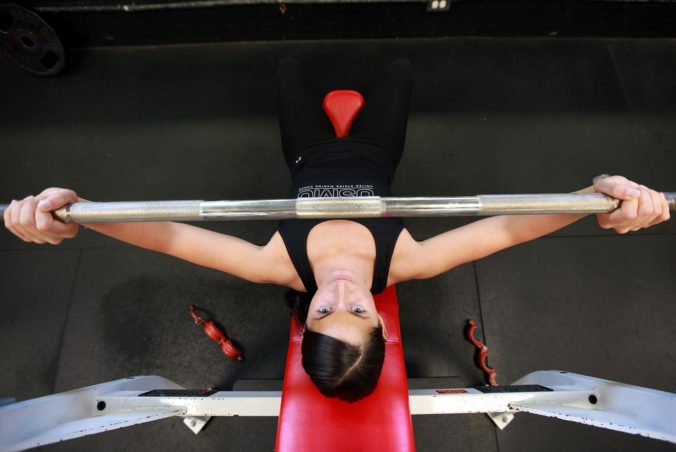The last week brought about several conversations that have left me fuming. What makes me sad is the fact that the majority of these had to do with fitness, and reflected the myriad ways in which I feel the fitness industry is consistently failing a very large part of the population.
I’ll be perfectly honest: I reached a point where I was very tempted to hide in bed, covers over my head, muttering people suck! under my breath.
I may even have done it for a few minutes.

Not my actual arm. Or my actual bed. I do, however, have those same sheets. Close enough, right?
Despite these fleeting thoughts, I don’t actually believe that people fundamentally suck—not all the time, anyway— which is why I’ve decided to take advantage of the platform that I have and speak up instead.
So, how is the fitness industry failing you, exactly?
TELLING YOU THAT MORE IS MORE
I was sitting with a former colleague last week over coffee, catching up on our lives since we’d last seen each other. She’s a very driven young woman, working two jobs to make her ambitious dreams come true. This, over the last few years, has come at the price of good health: functioning with very little sleep, dealing with humongous amounts of stress, finding herself with an erratic appetite, etc.
Yet in her mind, the problem was simply that she wasn’t disciplined enough. She was only training three times a week. If only she could train more, she would certainly achieve her physical goals.
I wasn’t particularly surprised by this line of thought: as soon as one combines the warped messages of Fitspo (#noexcuses, anyone?) with any degree of perfectionism, this is bound to happen. And this is exactly why millions of women right now are beating themselves up, day after day, in and out of the gym, believing that their lack of results is a sign that there’s something wrong with them.
What angered me, though—beyond my usual irritation at the constant insidious messages created to make women feel that they are never doing enough—was when she told me of just having hired a trainer who had ramped up her workouts, making sure that she now saw him four times a week for vomit-inducing sessions.
What’s the issue, you ask me?
That’s the most perfect recipe for overtraining if I’ve ever seen one!

As enticing as intense exercise may look and sound, progress can only occur with adequate rest and recovery!
See, for any progress to occur, regeneration needs to happen. Makes sense, right? And how can we make that regeneration happen? REST.
If you take someone who is already under-rested, under-nourished and over-stressed and simply add more stress to their life—because let’s not forget that a lot of exercise is stressful for the body—you’re putting in place all the elements that will further the lack of balance in this person’s life.
If you take under consideration that some of the manifestations of overtraining are insomnia, depression, a higher incidence of injury and a lack of progress, where’s the appeal?
In many cases, more is not better. You have to have the fundamentals in place first, even the least seductive ones: adequate sleep, sound nutrition, enough non-exercise movement.
Is it sexy? Probably not. But ask yourself this: how long will you be able to keep going before you burn out?
TELLING YOU WHICH GOALS YOU SHOULD HAVE
“I don’t care about having a bikini body!” she said, looking at me defiantly. I could feel an edge of apprehension in her voice.
I was talking to a new coaching client, and I had just asked her what her goals were. “I’m not here to impose any goals on you!” I reassured her.
“I do want to know, however, what your own goals are!” And just like that, our conversation resumed on what she actually wanted from our working together.
The fitness world’s doing a stellar job convincing us looks are what matter. But is your body really your only contribution to the world?
What fascinates me is that, through my conversations with the dozens and dozens of women with whom I work and to whom I speak on a continuous basis, I know they find being constantly bombarded by these messages is simply tiring. In fact, most of them come to me feeling broken: they tried doing more, they tried going the all-or-nothing way, and inevitably found themselves exhausted, overwhelmed and, more often than not, feeling terrible about themselves.
They’d failed at meeting this goal that society—via the media and fitness industry—was telling them should be paramount for them: achieving the best body they could, regardless of any obstacle or “excuse” they may have.
But what about all the other goals one might justifiably have? How about:
- Moving painlessly in everyday tasks?
- Having more energy to get through each day?
- Simply becoming more active in a way that fits our lifestyle?
- Wanting to keep up with our children or grandchildren?
- Picking up better nutritional habits?
- Finding enjoyment and ease in physical activity?
- Challenging ourselves to try something new?
- Spending time with friends doing something active?
- Performing better at a certain sport?
This list could go on for a long time. Are these goals truly inferior to looks? I certainly don’t think so.
Countless reasons can motivate one to be physically active, without *any* focus on looks. Why aren’t we celebrating them as we should?
I have to admit that I really appreciate working with clients when they’ve reached the point where what they want goes far beyond looks. That’s when we start tapping into what make their life worth it, and find ways in which we can enhance it so there’s simply more of the good stuff!
TELLING YOU THERE’S ONLY ONE WAY
While I certainly appreciate the multiplication of training modalities that have hit the mainstream in the last decade, I feel that, in the end, it’s made the fitness industry more clique-y than ever. And that’s something that I just can’t get behind. Of course, everyone wants to believe that they are right. That’s part of human nature, isn’t it?
Nonetheless, there’s a tremendous difference between enthusiastic conviction and self-righteousness.
If you find a way of training that really resonates with you and gets you the results that you’re seeking, that’s absolutely fantastic. If you start judging others because they choose to go a different route, then you and I have a problem.
Cultivating a sense of community is fantastic, but if membership in this community means that you’re also dissing everyone who doesn’t think the way you do, then you’re part of the problem.

Contrary to popular belief, there can be more than one way to achieve a certain goal!
Voices rising in every camp, proselyting ever louder about their having the answer simply create more confusion.
Just as in other areas of life, this type of extremism fails the population at large, because no matter what modality they’re defending, the message remains the same: either you’re all in, or you’re a loser because you’re rejecting the possibility of being among the chosen few.
There’s a further problem with this way of approaching things: it perpetuates the idea that there are magic fixes, and that if you just manage to find the right one, then you’ll be good to go. And this, sadly, is as unsustainable as it is untrue. Consider this: behind every one of those polarizing fitness debates are commercial interests, no matter how small. Is being a pawn in these schemes something we really want for ourselves?
Truth is, as diverse as individual goals are, so are the ways to reach them. What works for someone at some time may not work forever, nor will it be the way to go for someone else.
If as much resources and energy were devoted by fitness professionals in helping people instead of trying to prove themselves right and everyone else wrong, we’d already be in a better place!


